She lost her sense of smell. It almost ended her business. How COVID, anosmia changed a life
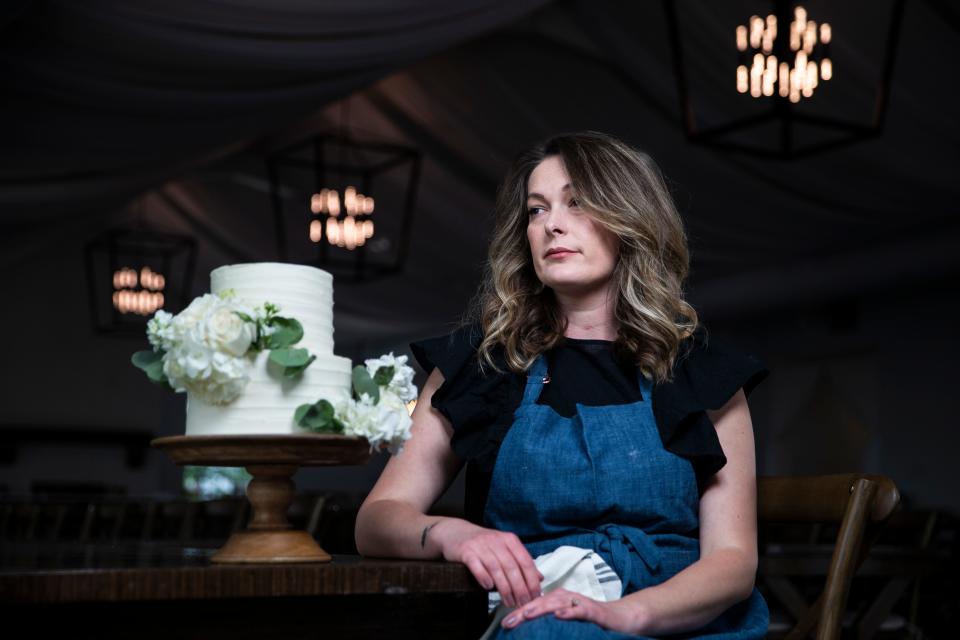
She never even smelled the smoke.
By the time she heard the smoke detector shrieking, cake batter was already smoldering on the oven coils.
And when Whitney Leighton whipped open the door of her Frigidaire to check on her cake, the rush of air released a thick cloud of smoke and breathed the embers into flames.
Whitney spun from corner to corner, finally found the can of baking soda, and dumped it onto the fire. The flames sputtered. Whitney assessed the damage.
A smoky film covered her white cupboards. The oven was coated in blackened drippings and white baking soda. The half-baked cake – vanilla-almond, one of her signature flavors, the one that perfected birthdays and weddings and helped keep her bakery business running – was ruined.
Spatula in hand, Whitney sunk to her knees and started scraping cinders.
COVID, she thought. Stupid, stupid COVID.
It had been months since she had gotten through her own bout with the virus, dozing on the living room recliner while everyone else did the cooking that Christmas Eve in their Prairie City, Iowa home.
The first time she realized she couldn’t smell the roasted meat, or taste the Jell-O, that had been scary, of course. But it wasn’t the first time she had been scared.
That first pandemic year – when the brides called in tears, rescheduling by the dozen. The years before that, before the photo shoots and the magazine features, when she had just enough energy and sugar to make cupcakes to sell at the next farmers market. The early years when there wasn’t really enough food at all.
None of that had stopped her. But this?
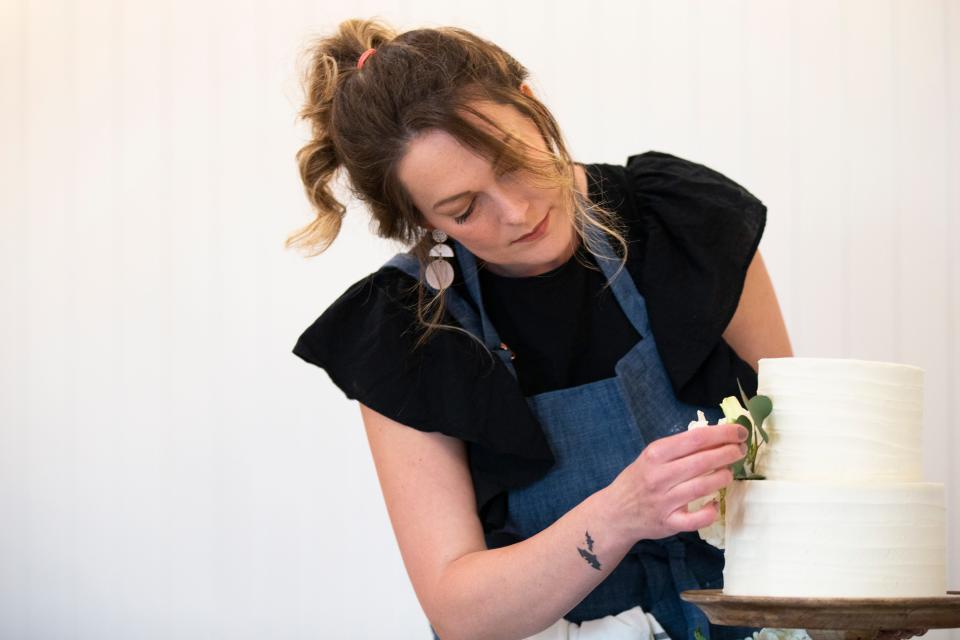
It was late March and Whitney’s sense of smell still wasn’t right. Sometimes she smelled nothing at all, a condition called anosmia, and one of the first widely recognized effects of the disease. Other times, scents were distorted, everyday items somehow reeking of corpses and burnt hair with a dash of sweetness. That’s parosmia.
Researchers say as many as 1.6 million people have long-term olfactory disorders caused by the virus. What was once an overlooked, invisible disability – one with no reliable test or consistent measurement – has been thrust into the spotlight.
More: For some, parosmia means facing the end of a career
While Americans knew the coronavirus might steal their sense of smell, at least temporarily, long-term parosmia has come as a shock to many. They’d never heard of the condition that now makes them retch at the scent of their favorite foods or experiences, or even the people they love.
There’s no surefire cure for these smell disorders. And nobody – not those affected, not their doctors, not even researchers – is sure what will happen next. The Biden administration recently ordered a new national plan that includes addressing how disability benefits should be handled for people with never-ending symptoms, including, possibly, people who can’t work because of their damaged sense of smell.
More: Why do my dogs smell like orange slices? The latest research on how COVID messes with smell
More: You caught a virus and recovered. But what happens when that virus stays inside you forever?
Parosmia had made Whitney anxious, angry. And anosmia had taken everything that once came so naturally and made it hard.
Little Blackbird Bakery, the business she built, ran on her recipes. She knew the batter was right by taste, could tell the cake was done by smell.
After COVID-19, every decision had to be backed up by a taste tester, every recipe parceled out by teaspoon and measuring cup.
And even that hadn’t saved her from the fire. She had filled the pans just a bit too much. When she stepped away, the batter oozed down to the oven coils. She never even smelled the smoke.
Kneeling on the floor of the little gray kitchen, her already-dirty black apron now coated in baking soda, Whitney rubbed her eyes.
She could see the end of her bakery. It would be easier just to quit.
But there had never been any cutting corners in this business. Everything that got made got made by hand, from scratch, even if she had to do it the hard way.
She pulled herself up off the oak floorboards and pulled out a freshly washed set of mixing bowls. Two and a half cups of flour. Two cups of sugar. One tablespoon of baking powder.
The thrill
Growing up, it seemed things always came the hard way. Whitney’s dad was on disability. Her mom worked multiple jobs to keep the family afloat. In a house with growing kids, some weeks every meal was peanut butter and jelly.
They moved around Iowa enough that it got hard to say which place felt like home. But Oskaloosa was the place that felt special.
That’s where her parents grew up. Where her aunts, uncles and cousins had been for years. And where Maxine, the family matriarch, pulled everyone together.
Technically Maxine was Whitney’s great-grandmother. But in a big, complicated family where some people were in the picture and some were out, Maxine was always Grandma.
And for a skinny little granddaughter, Grandma’s kitchen was pure thrill.
At the holidays there was not just a pie, there were pies, and by pies Grandma meant a dozen at least: apple, cherry, pumpkin, you name it.
Whitney’s mom helped make them, Grandma’s way – by hand, from scratch. And every year, on top of one pie, sat Grandma's cherished pie whistle. The little ceramic bird figurine nestled in the top crust, and when the filling inside put off just the right amount of steam, the blackbird let out a high-pitched trill that the pie was ready.
The aroma of the apple and cherry pies warmed Whitney from the inside out. So did her great-grandmother.
Grandma had had 13 children and quilted blankets for her family. She also told dirty jokes and loved the occasional trip to the casino. She could play penny slots all day and somehow always came home with double her money. When she cussed, she whispered it, like she was sharing a secret.
She smelled sweet when she hugged you, floral, musky and somehow cozy.
Whitney was 12 when she baked her first Thanksgiving pie. It was apple pie, the slices peeled by hand with a paring knife.
Years later, Whitney married a welder and was a stay-at-home mom to their three children. Money still was tight and baking could bring in a little extra cash – a few cookies here, a birthday cake for a friend there.
She taught herself by looking for ideas on Pinterest and online recipes. She made Grandma’s favorite, red velvet cupcakes, sweet but with the twang of the buttermilk, the sharp edges of vinegar.
She even tried making fondant, the gourmet coating that can wrap a whole cake in an artistic sheath. She laughs about it today, because now she’s a pro.
“It was hideous,” she said. “It was buckling and terrible. It was tearing in spots.”
Sometimes friends would tell her she should open her own bakery. Your cakes are better than anyone else’s, they would say. You should run your own shop. Whitney never thought that. They were just being nice.
Even Grandma said it.
Why don’t you do it? she’d ask. You’re really good.
Whitney still didn’t believe it.
By 2013, Grandma’s heart wasn’t what it had been.
Whitney visited constantly. Grandma was usually sitting in her favorite chair in her bedroom and the pair would talk while the kids fed her goldfish. Sometimes they just watched "Jeopardy!" or "Wheel of Fortune."
Grandma always had guests. Thirteen kids had led to more than 200 grandchildren, great-grandchildren, even great-great grandchildren, so someone was always there.
For Grandma’s 88th birthday in August 2013, they had a party in the park, with a fan aimed at Grandma to keep her fresh in the summer heat.
Whitney made red velvet cupcakes, Grandma’s favorite. Sweet, but the sharp edges close by.
Grandma smiled and said they tasted real good.
When Grandma died, when the children began thinking about what to do with her belongings, Whitney didn’t even dream of asking for the one thing she wanted most. It was too precious. So many others had been in that same kitchen. She didn’t have a chance.
But the night after, Whitney’s cousin took her aside and handed her the little blackbird pie whistle.
“Grandma would have wanted you to have this,” her cousin said. Through her tears, Whitney took it as a sign.
The challenge
Little Blackbird Bakery began as a juggling act. Whitney was raising kids, working as a part-time nanny, and somehow saving enough energy to throw herself into the farmers market scene, plotting which markets to hit and what to bring. Cupcakes, she decided. Only cupcakes.
She baked late into the night refining her flavors. Black forest. Lemon raspberry. Pumpkin with cream cheese frosting.
Whitney worked the markets five or six days a week. She learned how to talk to people, how to promote her business, which treats people liked best. Customers asked about her bakery’s name and were always fascinated with the story of Maxine and the pie whistle. Soon, people were lining up. Her bacon chocolate caramel cupcakes became a runaway hit.
The orders flowed in, now from strangers instead of friends and relatives. Her first official order was a batch of graduation cupcakes with black and gold frosting.
She wanted to do everything, all the time. Working out of the small kitchen in her house, she used one stove, three refrigerators, a deep freezer, baker's racks and extra cupboards to get the job done.
And no fancy delivery van for her. She hauled orders around in a gray 2007 Chevy Suburban, pushing down the seats and stacking boxes in the back.
Whitney loved a challenge and hated to turn down clients.
“I've had to try and rein her in several times and reassure her that sometimes it really is OK to say no,” said friend Jessica Bannister, who calls herself “the reality-check friend.” “But she tries all avenues before saying no.”
Whitney's big break came when someone asked her to bake a wedding cake for a formalwear company’s catalog. She made a “nearly naked cake,” a layered confection with minimal frosting. Though popular in large cities, at the time, few bakeries offered them in Central Iowa.
Soon, Whitney's work was being featured in Better Homes and Gardens, Country Sampler, billboards, blogs and wedding websites. The price tags on cakes got bigger. She even sold one for $1,300.
The money changed her life. She and her husband could do things they'd never done before. Baseball league for their sons, and buying jerseys for the other kids who couldn't afford them. Makeup for their daughter. Dinners out, especially sushi. Family vacations to California.
She sketched out upcoming orders on a whiteboard, detailing each dessert and event. Clients, especially her engaged ones, weren’t her customers. They were family, at least for a little while. “My couples,” she called them.
Fans voted her the best wedding cake baker three years in a row in the Central Iowa Wedding Choice Awards.
The contest wins, the magazine spreads, they were good for business. But her best moments came away from the limelight. It was when clients tried her treats for the first time, that moment when they closed their eyes, let their heads drop back and murmured, “Mmmmmm.”
The scary part
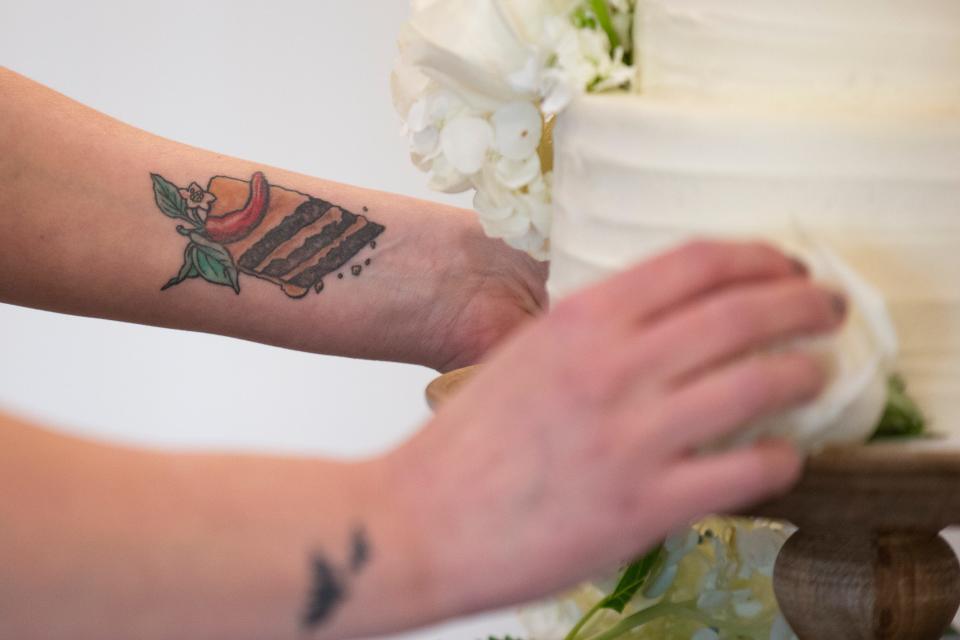
The pandemic was hard on Whitney’s hands. She loaded up on masks and vitamins and washed her hands until her dry knuckles bled.
But it was harder on her heart. When the brides started calling in 2020, they were in tears, or their mothers were, calling to cancel, postpone, reschedule, anything. These were not the wedding days they had dreamed of.
They kept calling until the number of disrupted weddings passed three dozen.
The intensity of emotions wore on her. “It was overwhelming and terrifying,” she said. But she had to stay calm. Comforting the families meant saving the business.
The next year, when things should have gotten easier, they got harder. She had to care for an ailing relative. She did 186 weddings to accommodate all the cancellations from the year before. And off and on, throughout the year, she and her family struggled with colds.
By then, the highly contagious omicron variant was sweeping the country, Delta was still swinging, and even those who took stringent precautions were coming down with it. In late December, Whitney’s daughter caught the virus.
Whitney got it too. She was exhausted, coughing, aching and feverish. She was later diagnosed with pneumonia and damage to her lungs.
On Dec. 24, she woke up with no sense of smell.
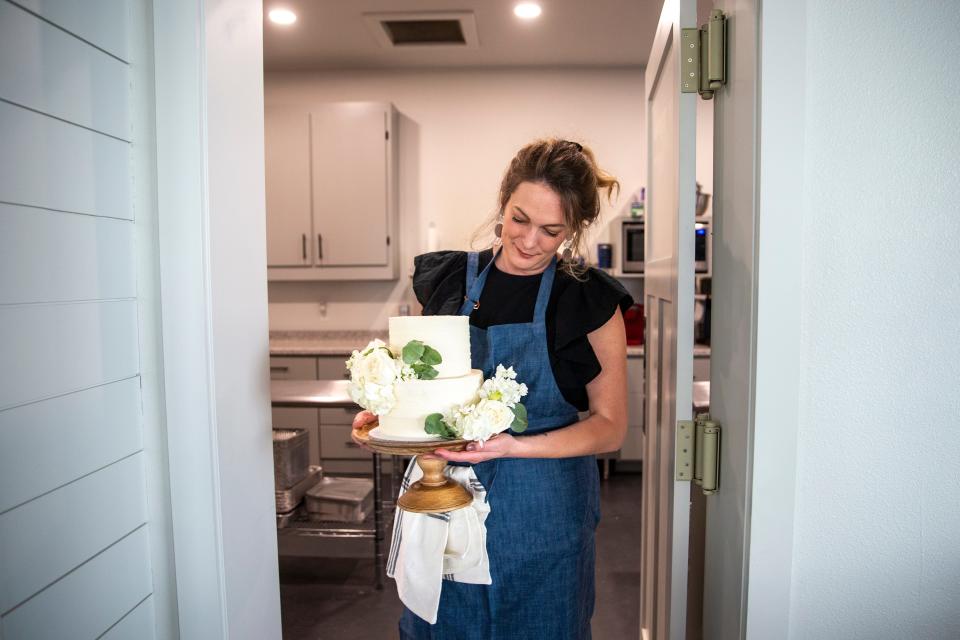
Every Christmas Eve the family would make menudo, and the smell of the meat was so strong they had to cook it in the garage. But this time, when her husband brought it inside, Whitney couldn’t smell it.
Then she realized she couldn’t taste her popsicles or Jell-O. She was nervous but too sick to worry much about it.
Whitney started baking for her first wedding of 2022 on Jan. 6, and she still had anosmia. She was exhausted but had to make her signature vanilla almond cake. Her assistant had left two bowls of batter in the refrigerator: vanilla and lemon.
They both looked the same. Now both smelled the same, which is to say they smelled like nothing at all. So Whitney took a chance and added almond extract to one of the batters, hoping it was vanilla. It wasn't.
“I lost around $100 in ingredients and supplies for a five-tier cake that had to be tossed out,” she said
From then on, every ingredient had to be labeled. Everything became precise. Instead of knowing by smell when her cookies or cakes were done, Whitney now used a timer. Measuring cups and spoons became the norm. Her husband and children became her taste-testers.
The anosmia lasted about three weeks. As is common, she regained some of her taste and smell, catching sweet or salty flavors. Bitter and sour tastes took longer to regain. Whitney could bite into a raw lemon until early February before it registered as sour.
Then, on March 10, everything went haywire. Popcorn tasted like burnt trash. The collard greens seemed off. Fried chicken smacked of rotten meat.
The next day, her smell went bad.
“I was so angry and confused,” she said. “I was also scared because I didn't know what was going on.”
Within two days she had torn through the internet, found some parosmia forums and diagnosed herself. Then she went to the doctor.
The doctor insisted that Whitney had COVID-19 again. Whitney insisted it was parosmia. After some research, they finally agreed.
Oh yeah, the physician said. That’s definitely what it is. But there is no definitive cure. There wasn't much to say.
Whitney's anxiety in the kitchen began to soar. How could she turn on the oven when it smelled like a rotten corpse? Her breath quickened, her thoughts scattered.
Whitney knew what would happen if Grandma were still there. She’d make some joke. And what would happen if this had happened to Grandma herself?
“She'd probably cuss,” Whitney said, “and say something like ‘Everything tastes like ass.’”
She’d whisper it, of course.
The hard way
Researchers are still trying to make sense of the mechanics of COVID-19-induced smell loss. Several recent studies, including one led by Johns Hopkins Medicine, suggest inflammation caused by the virus damages smell nerves.
Experts also believe parosmia is a sign of smell nerves trying to heal themselves. The problem is that during that process, they are sending the messages to the wrong part of the brain, triggering the wrong memories of what things are supposed to smell like, said Ahmad Sedaghat, a doctor at the University of Cincinnati College of Medicine who specializes in nose and sinus problems.
“They’re danger signals,” he said. “That’s how (the cells) rewire. We err on the side of being able to detect danger.”
That’s how Whitney feels.
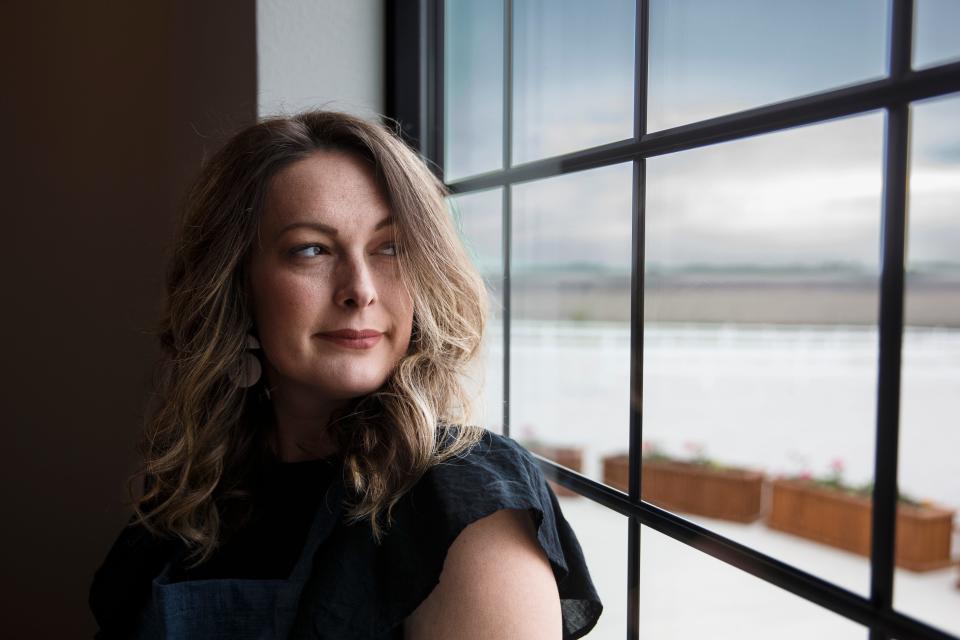
“Just turning on my oven gives me anxiety because the smell is of that burnt corpse smell,” she said. “It instantly triggers my fight-or-flight mode because my brain feels like it's telling me to run away, like I'm in danger and my brain’s trying to get me out of the situation.”
Adding to the frustration is that patients say their primary care doctors don’t even know what parosmia is.
Doctors like Sedaghat say there is hope. But regaining a sense of smell takes time and work, he said. His main suggestion is smell training, where people regularly breathe in a mixture of scents including lavender and lemon to help rewire their brains.
“People are resilient,” he said. “It seems like there’s a lot of hope for people to get better.”
For Whitney, there are good days and bad days. Some smells – strawberry, vanilla, peaches, coconut – have come back. Others, chocolate, coffee and lemon among them, remain rancid.
She has scaled down her work, going from her usual 70 weddings a year to a maximum of 50. She’s considered shutting down Little Blackbird Bakery, if only for a little while. It seems as if there’s too much she still can’t do.
But there has never been any cutting corners in this business. Anything that gets made gets made by hand, from scratch, even if they have to do it the hard way.
It’s a Saturday in May, almost half a year since COVID-19 hit her and everything went wrong. Somehow, in spite of deciding to scale back, Whitney’s baking three wedding cakes, five sheet cakes, 750 mini cupcakes, 100 cookies, 45 brownies and 45 caramel blondies.
The back of the gray Suburban is packed and the deliveries are made. Three weddings and a prom.
At age 34, baking for Whitney is not the same as it was. She depends more on her two part-time assistants now, and on her husband and her kids.
Whitney keeps the pie whistle in a picnic basket with Grandma’s yarn and a few of her shirts, the sweet, musky, cozy ones she can no longer smell.
She keeps her Instagram feed fed and a steady stream of items on her menu. Bacon chocolate caramel cupcakes, which are still a hit. S'mores brownies. Caramel blondies. And the cakes, all sophistication and sparkle.
The almond strawberry and pink champagne, with silver glitter flakes on the middle tier.
Or the three-tier one covered with torn wafer paper. The shards stretch upward from the top layer. Translucent, they seem to glow.
She calls that one the Maxine.
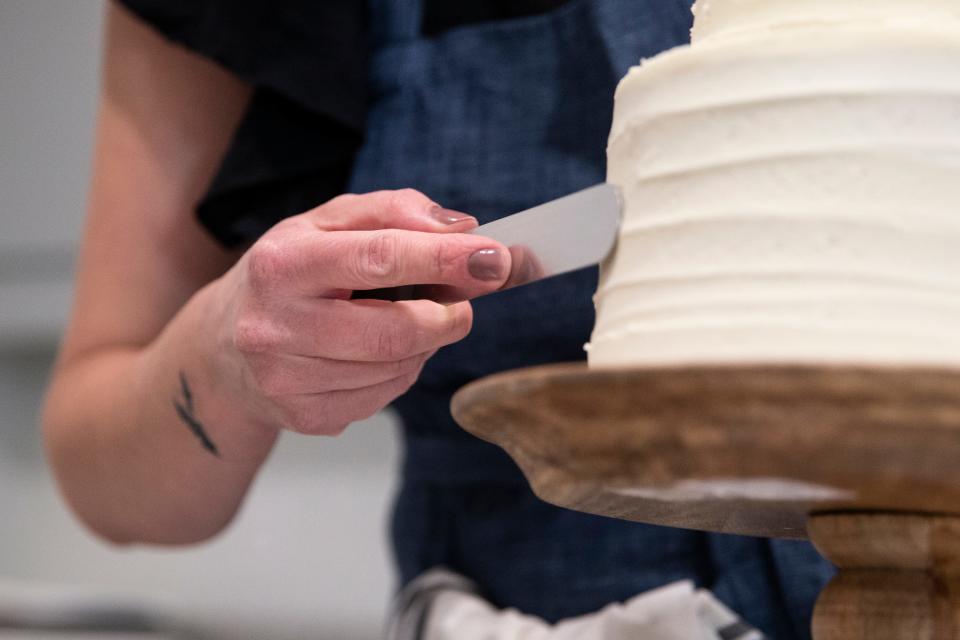
Whitney may have adapted her business to her new reality, but she often thinks about what she misses.
The scent of lilacs. The earthy, mildewy scent of the forest. Popcorn for movie night. The coffee that woke her up each morning. The scent of her husband’s cologne when he hugged her. The smell of a snuffed candle on her child’s birthday cake.
They’ll come back, she thinks. They have to.
This article originally appeared on USA TODAY: How post-COVID anosmia, parosmia changed a business and a life

 Yahoo Movies
Yahoo Movies 